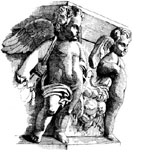
What Baylor & Notre Dame Can Learn From Each Other
RESISTING SECULARIZATION
I was an undergraduate at Baylor University in the early 1960s and returned there as a visiting faculty member in the philosophy department for the fall semester of 1994. Since I have spent most of the intervening years on the philosophy faculty at Notre Dame, I had occasion while at Baylor to reflect on the similarities and differences in the approaches of these two great Christian universities to the secularizing influences that have transformed so many formerly Christian colleges and universities in this country. There are lively discussions going on at both Notre Dame and Baylor about these issues, and my reflections here were originally prepared for a group of faculty members and administrators at Baylor who meet regularly to discuss these issues. Since the threat of secularization is clearly much on the mind of administrators and teachers at all of those religiously affiliated universities continuing to maintain strong ties to their founding religious traditions, I thought these reflections might be of more general interest.
It is important to remind ourselves of how few such universities remain. If we restrict our discussion to institutions of higher education with a realistic chance of becoming (or remaining) research universities of the first rank, there are surely only a handful. The processes of secularization, as a number of recent studies have emphasized, have taken less of a toll on Catholic universities. Georgetown, Fordham, Notre Dame, and Boston College have all maintained rich ties to their Catholic roots, but even at these universities much concern has been expressed in recent years about creeping secularization. Among Protestant universities, the picture of course is much bleaker. Secularization in the world of Protestant universities arrived earlier and hit harder. The great Methodist universities — Duke, Northwestern, Boston University, Southern California, Vanderbilt — maintain at most symbolic ties to religious traditions which once guided the content of their curriculum. The Ivy League universities were secularized even earlier, and at them not even symbolic ties are maintained to their former religious traditions. At times this process of secularization produces comic moments, as when the recently inaugurated president of Duke was shocked to discover that the university seal made reference in a politically incorrect manner to a Deity. She reacted as if she had discovered that the Duke Board of Trustees was packed with members of the Klan. Baylor alone among major Protestant universities has a chance both to become a research university of the first rank and also to maintain rich ties to its Protestant tradition. There are, of course, a number of outstanding Protestant colleges which continue to resist secularization — Wheaton and Calvin come to mind — but none of these is poised as Baylor appears to be to move in the direction of becoming a major research university.
First, what are the similarities between Baylor and Notre Dame that make it appropriate to compare their approaches to secularization? The most important is that Notre Dame and Baylor have maintained, against the tide of secularization, so much of their traditional religious identity. Unlike Duke and Northwestern, Baylor and Notre Dame have a religious identity, clear steps are being taken to preserve it, and a lively discussion about how to preserve it is going on at both universities. But, also, the schools are similar in that this continuity of religious identity is coupled with relatively recent moves to loosen the ties with their religious traditions. In 1992 Baylor modified its charter in order to distance itself from certain forms of direct control by the Texas Baptist Convention. This change has seemed to some as a threat to Baylor’s continued Baptist identity. In a similar fashion, Notre Dame — along with many other leading Catholic universities — took steps in the mid-1960s to distance itself from direct clerical control. Two events are relevant here. At a famous conference of leaders in Catholic higher education at Land-O-Lakes, Wisconsin, in 1965, a number of leading Catholic universities affirmed a commitment to academic freedom which seemed to many persons at the time to threaten the Catholic identity of traditional Catholic colleges and universities. At about the same time, the Congregation of the Holy Cross (the Catholic religious order that founded and owned Notre Dame) turned the university over to a secular Board of Trustees. Certain forms of control were maintained by the Congregation in this change. The president of Notre Dame, for example, is required to be a member of the Congregation, and the very highest governing body of the university (the seven member Board of Fellows), though appointed by the Trustees, is required to have a majority of Congregation priests on it unless or until this requirement is overturned by the Fellows themselves.
The combination of this handing over of Notre Dame to a broadly secular board and Notre Dame’s strong commitment to academic freedom resulted in a discussion in Catholic circles not dissimilar to the discussion in Baptist circles about the charter change in 1992.
You May Also Enjoy
Review of Justice, Peace, & Human Rights: American Catholic Ethics in a Pluralistic Context... The Reshaping of Catholicism... Sophisticated Rebels: The Political Culture of European Dissent, 1968-1987... A Rocking-Horse Catholic... Caryll Houselander: That Divine Eccentric... In the Name of Jesus: Reflections on Christian Leadership... and Starting Out in the Thirties
Two Sciences: Creationist vs. Evolutionist... You Orthodox Bigots!... An Insider Speaks... Oops, There Go The Dominoes?... Dismayed? You Betcha!
Recently, I went to a center for teenage girls where the teacher asked what they…

